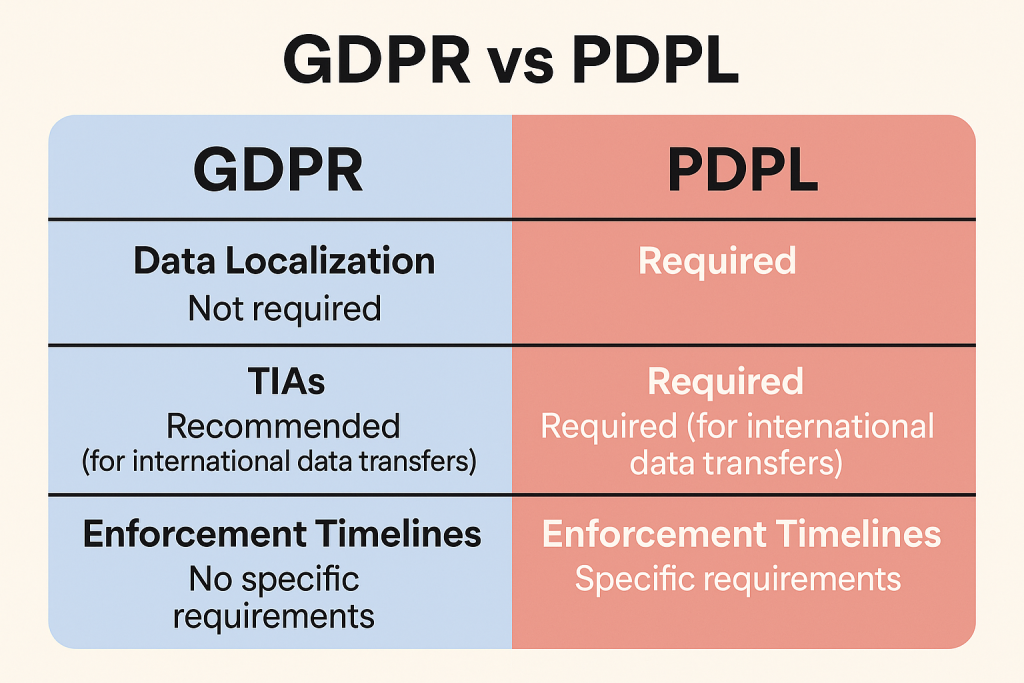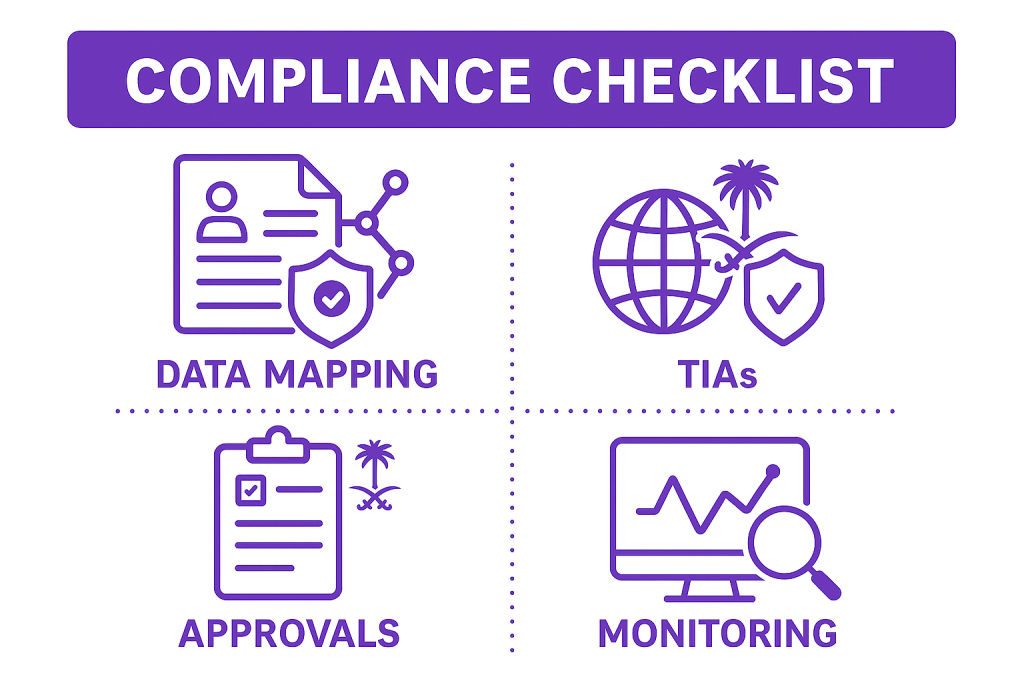PDPL Cross-Border Compliance

PDPL cross-border compliance for Saudi data transfers across global servers
Why PDPL Cross-Border Data Transfers Matter
In today’s global economy, PDPL cross-border compliance data doesn’t stop at borders. Cloud services, remote teams, and international vendors mean that personal information moves around the world every second.
But for companies in Saudi Arabia or those handling Saudi residents’ data this movement comes with strict rules under the Personal Data Protection Law (PDPL). Fully enforced since September 2024, PDPL reshaped how businesses must manage cross-border transfers.
The stakes are high:
- Up to 1 million SAR fines for unlawful transfers
- Imprisonment for executives in serious breaches
- Long-term reputation damage
As Dr. Fatima Al-Shammari, Data Law Specialist at King Saud University, puts it:
“Cross-border compliance under Saudi PDPL is not just legal red tape it’s a survival issue. Companies that ignore it risk losing both money and trust.”
👉 Source: SDAIA Official PDPL Guide
The Legal Foundation: PDPL and Transfers
At the heart of PDPL is Article 29, which states that data can’t leave Saudi Arabia unless certain safeguards are in place:
- Adequate protection in the destination country
- Standard Contractual Clauses (SCCs) or Binding Corporate Rules (BCRs)
- A legitimate transfer purpose
- Consent from individuals when required
- SDAIA approval for high-risk transfers
This framework makes cross-border transfers a compliance challenge businesses must solve before moving data abroad.
PDPL vs GDPR: Key Differences

PDPL vs GDPR comparison of cross-border compliance rules
It’s tempting to think PDPL is just another GDPR. But in practice, PDPL goes further in three areas:
- Faster enforcement less preparation time for businesses
- Data localization stronger pressure to keep sensitive data inside Saudi Arabia
- Mandatory Transfer Impact Assessments (TIAs) required for transfers to non-adequate countries
💡 As PwC Middle East notes in its 2024 PDPL Report:
“Organizations compliant with GDPR cannot assume PDPL compliance. The Saudi framework adds unique requirements, especially around localization and national interest.”
👉 Reference: PwC PDPL Report 2024
Why Businesses Can’t Ignore Transfers
Cross-border transfers aren’t just technical details they’re strategic risks. Consider these common scenarios:
- Cloud providers hosting data outside Saudi Arabia
- Multinational vendors processing Saudi data abroad
- Remote staff accessing systems from other countries
- Expansion strategies relying on smooth global data flows
Each of these can trigger regulatory fines, delays in contracts, or loss of client trust if not handled under PDPL rules.
TIAs: The Must-Do Step
PDPL requires businesses to conduct a Transfer Impact Assessment (TIA) when:
- Sending data to countries not on SDAIA’s adequacy list
- Exporting sensitive data in large volumes
- Repeated transfers occur
A proper TIA should cover: - The recipient country’s legal protections
- Risks to individuals’ rights and freedoms
- Possible impact on Saudi Arabia’s national interests
- Safeguards applied by the organization
💡 How Sahl helps: Sahl automates TIAs with SDAIA-approved templates and produces audit-ready reports saving time and reducing risks.
Beyond SDAIA Approvals
Approval from SDAIA is only the beginning. Businesses must also:
- Document transfers purpose, frequency, and legal basis
- Minimize data shared only what’s necessary
- Maintain ongoing safeguards not just one-off protections
- Keep an audit trail ready for inspection at any time
In February 2025, SDAIA issued a Risk Assessment Guideline outlining four phases: Preparation, Risk Identification, Compliance Evaluation, and National Interest Impact. This now sets the compliance standard regulators expect.
The Cost of Non-Compliance
Saudi Arabia has made its position clear: violations will not be tolerated. Penalties include:
- Unlawful transfers → up to 1 million SAR fine or 1-year imprisonment
- Misuse of sensitive data → up to 3 million SAR fine and 2 years imprisonment
- Repeat violations → double penalties
- Breach notifications → must be reported immediately (vs GDPR’s 72 hours)
As EY’s Data Privacy Insights (2025) warns:
“Saudi regulators are enforcing PDPL with far greater intensity than GDPR’s early years. Non-compliance is simply not an option.”
Quick Checklist for PDPL Compliance
To simplify compliance, businesses should follow this structured approach:

- Map and Classify Data Identify data collected, where it’s stored, and whether it’s sensitive.
- Check Adequacy Confirm if the recipient country is on SDAIA’s adequacy list. If not, prepare SCCs or BCRs.
- Conduct TIAs Document legal, operational, and national risks, applying mitigations.
- Get Consent & Approvals Secure consent when required; engage SDAIA for high-risk transfers.
- Monitor Continuously Log every transfer, update safeguards, and keep audit-ready reports.
Case Study: A Saudi Startup Expanding
A Riyadh-based SaaS company planned to store data on EU cloud servers while scaling into the GCC.
Challenges:
- EU not on SDAIA’s adequacy list
- Enterprise clients demanded compliance guarantees
- Manual TIAs caused contract delays
Solution with Sahl: - Automated data mapping
- Pre-configured SCCs aligned with SDAIA
- Real-time monitoring of transfers
- Instant TIA reports
Results: - Closed deals 40% faster
- Cut compliance workload by 60%
- Eliminated risk of fines
Sahl: The Compliance Partner You Need
Sahl is more than software it’s a compliance partner. With Sahl, organizations can:
- Automate Transfer Risk Assessments
- Deploy SDAIA-approved SCCs and BCRs
- Map and classify data at scale
- Integrate consent frameworks
- Maintain a real-time Record of Processing Activities (RoPA)
- Generate regulator-ready reports
By embedding automation into compliance, Sahl turns regulation from a roadblock into a growth enabler.
Conclusion
Saudi Arabia’s PDPL has reshaped global data compliance rules. Cross-border transfers are now a central compliance risk and businesses cannot afford to ignore them.
By adopting structured processes, automating TIAs, and ensuring continuous safeguards, companies can:
- Avoid multi-million SAR fines
- Earn trust with clients and regulators
- Enable global expansion without delays
👉 Don’t wait until it’s too late. With Sahl, your organization can operationalize PDPL compliance and stay ahead of regulatory challenges.
FAQs on PDPL Cross-Border Compliance
- What is PDPL cross-border compliance?
It’s the process of meeting Saudi Arabia’s requirements for transferring personal data outside the Kingdom. - Is PDPL stricter than GDPR?
Yes. It enforces faster timelines, stricter data localization, and mandatory TIAs. - Do all transfers need SDAIA approval?
No. Only high-risk or sensitive transfers require prior approval. Others may rely on safeguards like SCCs. - What are the fines for violations?
Fines can reach up to 1 million SAR, with imprisonment for serious or repeat breaches.

